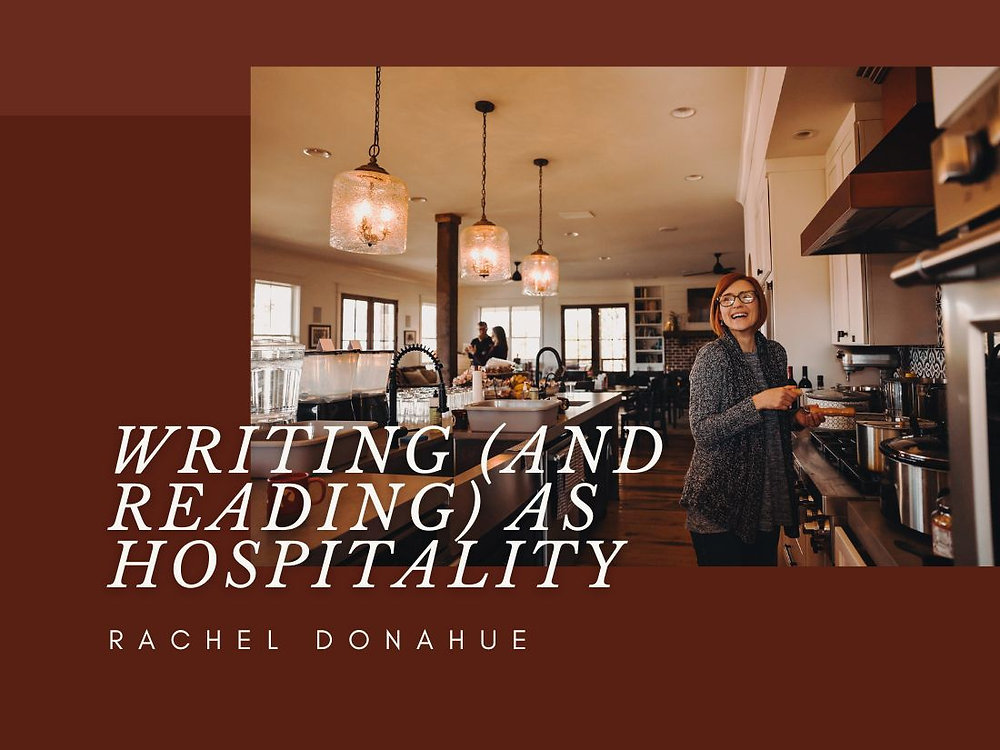Hospitality: the friendly and generous reception and entertainment of guests, visitors, or strangers.
If you’ve been around the Rabbit Room for any length of time, you’ve heard of The Habit. You might be familiar with the podcast, the weekly newsletter, or possibly Jonathan Rogers’ work from Flannery O’Connor to his swamp stories.
But what about that community of writers he’s gathered who give each other a little more courage?
The Habit membership is a hub of community unlike anything any of us had experienced before. Agented authors and writing coaches are learning alongside hobby writers and amateurs—each of us here for the love of the craft. We work through classes and workshops together. We share interesting things around the “Water Cooler.” We comment on and celebrate each other’s work. Even though our interaction is limited to a forum and the occasional Zoom meeting, our connections are deep and genuine, as evidenced by the five Habit writers’ retreats we’ve held at North Wind Manor. This community is one of the most generous and hospitable groups I’ve ever participated in.
As an OG member of The Habit, I’ve heard many bits of writerly wisdom from the likes of C.S. Lewis, Flannery O’Connor, Dorothy Sayers, Harper Lee, Jane Austen, P.G. Wodehouse, Madeleine L’Engle, and more, but the line that has most profoundly impacted me over the years is Jonathan Rogers’ assertion that writing is a form of hospitality.
This resonates deeply because exercising hospitality toward friends, visitors, and strangers is one of my favorite things.
Real-world hospitality includes thoughtfulness, an anticipation of needs, a welcoming environment, and a regard for the dignity of the person being received or entertained. Hospitality also looks different in different cultures, so knowing something about who I am welcoming will change how I prepare to receive them.
On the page, hospitality isn’t much different. Thoughtfulness about the presentation of an idea, the anticipation of what a reader needs (or doesn’t need!) to know, setting a scene that orients the reader, and care for how my words will affect the reader are all vital to my craft—as is knowing my audience.
For any writer who’s not simply writing as a form of self-indulgence, the job is to communicate effectively, to create a scene that invites the reader in, and to show the reader something he couldn’t get for himself. Every writing tool, from grammar rules to Freytag’s pyramid, can be used in the service of hospitable writing.
But here’s an important reminder I received at the most recent Habit retreat: hospitality doesn’t just go one way. Yes, the hosts go to a great deal of trouble to prepare the space for guests, but guests usually bring something to the table, too. Sometimes, it’s a literal gift—like a bottle of wine or sweet treats. Sometimes, it’s a story.
Jonathan always reminds guests at a Habit retreat that much of the goodness we experience over the weekend is the welcome we extend to each other. This mutual hospitality affects how we speak and listen, how we inhabit the space, and how we make space for others.
I saw this embodied once again at the most recent Habit Retreat. Friendly faces and voices welcomed one another around tables. Timid first-timers plucked up the courage to read aloud to an attentive, supportive crowd. Seasoned retreaters reveled in wordplay to everyone’s delight. Knowing that your audience is ready to laugh or cry or gasp in horror with you breathes confidence into how you put your words into the world.
Taking this idea to the page, hospitality is not just about how we write but how we read what other people have written. Engaging with someone else’s work is an act of hospitality, too. When I pick up a book (or read a blog post!), I am sitting down at a table that my host has prepared. I am receiving what they have to give. I am extending the hospitality of a listening ear, the gift of my presence, and a willingness to commune over ideas.
Not all writers or writing programs are hospitable (a couple of MFA grads testified to that during the retreat), and not all readers are a welcoming audience. But I can tell you this: of all the bookish spreads I’ve sampled over the years, it’s the most gracious, generous, writerly hosts who keep me coming back for more—and a great many of them are people I’ve met through The Habit.
Rachel S. Donahue holds a B.A. in English and Bible from Welch College and enjoys travel, housewifery, and homeschooling while fulfilling her role as Chief Creative Officer of Bandersnatch Books. She wishes she could host you at Chittering Cottage (her family’s home in NC) for a cup of tea and a chat. Instead, she’ll write you poems. She’s published two collections: Beyond Chittering Cottage: Poems of Place, and Real Poems for Real Moms: from a Mother in the Trenches to Another. Find her work at www.BandersnatchBooks.com.
If you’ve enjoyed this article or other content coming out of the Rabbit Room, you can help support the work by clicking here.
Our weekly newsletter is the best way to learn about new books, staff recommendations, upcoming events, lectures, and more. Sign up here.
Cultivating and curating story, music, and art to nourish Christ-centered communities for the life of the world.
